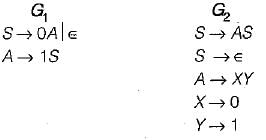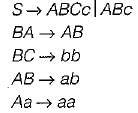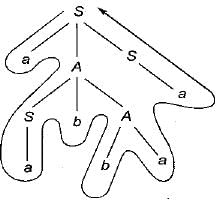Test: Lexical Analysis- 2 - Computer Science Engineering (CSE) MCQ
15 Questions MCQ Test - Test: Lexical Analysis- 2
In a two pass assembler pseudo code EQU is to be evaluated during
Pick the functions which are completely performed in pass 1
If two finite state machines M and N are isomorphic, then
Consider the following issues:
1. Simplify the phases.
2. Compiler efficiency is improved.
3. Compiler works faster.
4. Compiler portability is enhanced.
Which is/are true in context of lexical analysis?
If G is a grammar with productions
S → SaS | aSb | bSa | SS | ∈
Where S is the start variable. Then which one of the following strings in not generated by G?
For the string aabbaa give the derivation tree using grammar:
G = {{S, A}, {a, b}, {S → aAS, S→ a, A → SbA, A→ SS, A → ba}, S}
Consider a program P that consists of two source modules M1 and M2 contained in two different files. If M1 contains a reference to a function defined in M2 the reference will be resolved at
Consider line number 3 of the following C-program.
int main () { /* Line 1 */
int i, n; /* Line 2 */
fro (i = 0, i < n, /+ + ); /* Line 3 */
}
Identify the compiler’s response about this line while creating the object - module
Consider the following grammars:

Which of the following statements is not true?
Hash tables can contribute to an efficient average case solution for
Consider the grammar:

Which of the following sentence can be derived by this grammar?

















